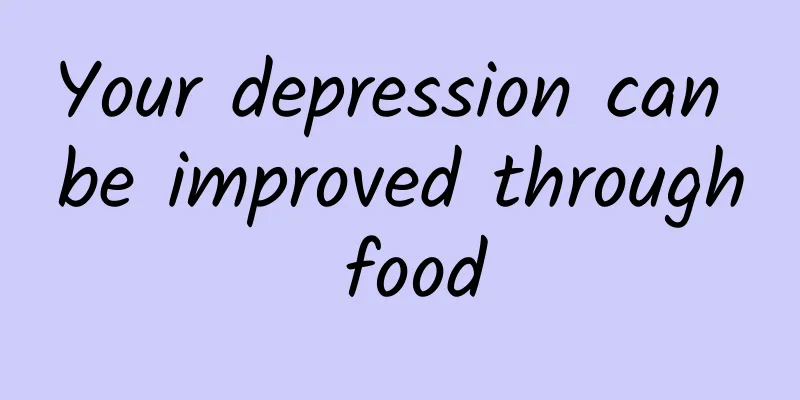Your depression can be improved through food

|
French fries, cola, fried chicken... When I feel bad, I want to eat... Let me ask, have many people had such an experience? When you are in a bad mood, you want to overeat. Because you are under a lot of pressure or feel depressed, you want to find food to vent. The fundamental purpose is to dispel unhappiness. From the root cause analysis, this is a manifestation of depression. A Small Encyclopedia on Depression (from the "Science Popularization China" Science Encyclopedia entry) Depression is the most common mental illness nowadays. It is characterized by continuous and long-term low mood and is the most important type of mental illness in modern people. Depression can manifest as a single or repeated depressive episode. The following are the main manifestations of depressive episodes. Psychological manifestations: low mood, lack of happiness, loss of interest, anxiety, inferiority, pessimism, hallucinations and delusions, often accompanied by self-blame and guilt, etc. Thinking and cognitive manifestations: decreased recent memory, prolonged reaction time, learning difficulties, reduced speech, difficulty in answering questions, etc. Physical activity manifestations: **Early awakening, sleep disorders, fatigue, loss of appetite and libido, unwillingness to interact with people around, restlessness, chest tightness and shortness of breath, suicidal thoughts or behaviors, etc. In fact, in addition to changes in mood, cognition, thinking, body, etc., some patients with depression are not the stereotypical pessimistic ones we are familiar with. They will hide their depressed side and wear a smiling mask to make people think that they are living a happy life, making the symptoms of depression more difficult to detect. From the perspective of motivation, it is the desire to gain happiness through food. But are you choosing the right foods? 90% of your depression can be improved by food. This statement comes from a medical doctor who is proficient in both psychiatry and nutrition. Based on his 36 years of clinical experience and more than 5,000 cases, he has confirmed that food can also dispel depression. In fact, the extent to which food can treat depression varies from person to person. But your depression can really be improved through food. Diet is closely related to common psychological disorders such as anxiety and depression. Many nutrients in food have a certain regulatory effect on the body's emotional response and behavioral changes. Many epidemiological studies have also shown that diet plays an important role in the treatment and prevention of depression. Dietary Patterns and Depression From the perspective of dietary patterns, the Mediterranean diet is characterized by vegetables, fruits, fish, whole grains, beans and olive oil. Food processing is kept as simple as possible, and local, seasonal fresh fruits and vegetables are used as ingredients to avoid the loss of trace elements and antioxidants. In 2019, the Melbourne University School of Health Sciences Research Center conducted a qualitative review of the results of 20 observational studies and 6 intervention trials and found that most (85%) of the studies and trials support that the Mediterranean diet can reduce the incidence of depression. Research on the relationship between oriental dietary patterns and depression found that a diet characterized by frequent consumption of red meat, poultry, sweet drinks and beer will increase the risk of depression. In comparison, eating rice, dark vegetables and light vegetables may be associated with a reduced risk of depression. Research results have shown that pregnant women with a lower intake of dark green leafy vegetables have a higher rate of prenatal depression. A French longitudinal 10-year follow-up study showed that the Western dietary pattern is mainly based on animal food, with a relatively high sugar consumption, and the nutritional characteristics are high energy, high protein, high fat, and low dietary fiber. This dietary pattern is significantly correlated with an increased incidence of depression symptoms. Nutrition and Depression From the perspective of nutrients, studies have confirmed that there are many nutrients related to depression, such as folic acid, vitamin B1, vitamin B6, vitamin B12, magnesium, omega-3 polyunsaturated fatty acids, tryptophan, etc., because nutrients such as tyrosine and vitamin B6 in food are one of the raw materials for synthesizing the neurotransmitter dopamine (which can transmit excitement and happiness, and our emotions will fluctuate with its concentration). Some scholars believe that an enriched environment has a certain effect on the behavior of depressed rats, brain-derived neurotrophic factor in the hippocampal CA1 region, and tyrosine kinase receptor B protein expression, and can improve depressive-like behavior caused by chronic stress. Tyrosine is a substance required for brain function and can directly affect emotions and cognitive functions. Foods rich in tyrosine include cheese, beef, yogurt, broad beans, lentils, pineapple, bananas, figs, mackerel, tuna, hairtail, sea bass, yellow croaker, mackerel, carp, oysters, crabs, abalone, etc. Vitamin B6 participates in the metabolism of various substances and energy in the body mainly in the form of coenzymes. When it is deficient, it can inhibit the activity of related enzymes such as glutamate decarboxylase in myelin formation, neurotransmitter synthesis and amino acid metabolism, leading to behavioral abnormalities such as irritability, movement disorders and tremors. Vitamin B6 comes from a wide range of food sources, usually in high concentrations in meat, whole grains, vegetables and nuts, and its bioavailability in animal foods is better than in plant foods. Foods rich in vitamin B6 include tuna, animal liver, walnut kernels, peanuts, mushrooms, whole wheat, millet, brown rice, oats, highland barley, etc. Vitamin B12 deficiency has many nonspecific manifestations, such as developmental delay, irritability and weakness; some changes in neurological responses may also occur, such as poor sensation, loss of deep tendon reflexes, movement disorders, low muscle tone, epilepsy and paralysis. A study reported that 24% of 75 patients with headache had serum vitamin B12 deficiency. After 3 months of vitamin B12 treatment, 18 patients had serum vitamin B12 close to normal, and symptoms such as anemia, headache and anxiety were restored. Its dietary sources are mainly animal foods, such as animal liver, lamb, beef, pork, chicken, fish, clams, eggs, milk, cheese and dairy products. Soy products also produce some vitamin B12 through fermentation. Getting the right amount of food intake is also important According to existing research results, almost all foods are related to the occurrence and regulation of depression. However, you must not focus on the single effect of a certain food and eat it too much. Eating too much of a good thing is also harmful. Therefore, it is recommended to start with the balanced diet guidelines of the "Dietary Guidelines for Chinese Residents (2022)", reasonably plan the amount and type of daily meals, and strive to "eat away" depression. v Food diversity : adhere to a balanced diet pattern with cereals as the main component, and make diversified and reasonable combinations across food categories. For example, daily meals should include cereals and potatoes, vegetables and fruits, livestock, poultry, fish, eggs, milk and legumes; it is recommended to consume an average of more than 12 kinds of food per day and more than 25 kinds of food per week. vBalance between eating and moving : Do not eat too much and maintain a healthy weight. The method for calculating healthy weight is: 18.5≤weight (kg)/height (m) squared<24; People of all ages should engage in physical activities every day, try to reduce sedentary time, get up and move every hour, and take 6,000 steps a day; engage in moderate-intensity physical activities at least 5 days a week, for a total of more than 150 minutes; encourage appropriate high-intensity aerobic exercise and strengthen resistance exercise 2-3 days a week. vEat more : fruits and vegetables, milk, whole grains, and soy. Among them, every meal should have vegetables, and ensure that no less than 300g of fresh vegetables are consumed every day, and dark vegetables should account for 50%. Dark vegetables refer to dark green, red, orange-red, and purple-red vegetables, such as garlic sprouts, celery, spinach, etc.; eat fruits every day, and ensure that 200-350g of fresh fruits are consumed every day, such as pineapples, bananas, etc. , and fruit juice cannot replace fresh fruits; more than 300ml of liquid milk every day. v Eat in moderation : natural and healthy foods such as fish, poultry, eggs, and lean meat, an average of 120-200g per day; eggs are rich in nutrients, and the yolks should not be discarded when eating eggs . Eggs can be boiled, fried, pan-fried, or steamed; it is best to eat fish twice a week, such as tuna, sardines, salmon**, etc. v Eat less : high-salt, high-sugar, and fried foods. Develop a light diet habit. Adults should not consume more than 5g of salt per day. Condiments such as chicken powder, monosodium glutamate, and oyster sauce contain high sodium. Some prepackaged foods are often high-salt (sodium) foods. To control salt intake, the best way is to buy less high-salt (sodium) foods and eat less pickled foods. Control the intake of added sugar, no more than 50g per day, preferably below 25g. Do not drink or drink less sugary drinks, and do not replace drinking water with drinks. Eat less sweet foods such as cakes, desserts, cold drinks, etc. Cooking oil 25-30g, trans fatty acid intake should not exceed 2g per day. Oils such as soybean oil, corn oil, and sunflower oil are not heat-resistant and are prone to produce trans fatty acids after frying or repeated heating. When purchasing cooking oil at home, pay attention to changing the variety frequently. The diversity of cooking oil varieties can provide us with a balanced guarantee of fatty acids and nutrition. Baked and fried foods, such as wafer biscuits, sandwich cakes, egg yolk pies, cocoa butter substitutes and chocolate products, ice cream, French fries, egg tarts, etc., may contain trans fatty acids. v Drinking should be limited: Children, adolescents, pregnant women, nursing mothers and patients with chronic diseases should not drink alcohol. If adults drink alcohol, the amount of alcohol they drink should not exceed 15g a day. When drinking, do not persuade others to drink or drink excessively, and drink in moderation. It would be better to adapt to the time and place China is a vast country with different regions and nationalities, and different folk dietary habits. You don't have to demand uniformity, the best is what suits you. References: [1] Wang Xuemiao. Study on the association between Chinese dietary patterns and depression[D]. Zhejiang University, 2020. [2] Shi Honghui, Liao Zhengrui, Zhou Wei, et al. Research progress on regulating anxiety and depression behaviors with plant-based dietary nutrients[J]. Chinese Food and Nutrition, 2020, 26(5):71-76. [3] Lü Yanyu, Jia Xiaofang, Huang Feifei, et al. Research progress on the relationship between dietary nutrition and lifestyle and depression[J]. Chinese Journal of Epidemiology, 2019, 40(4): 481-487. [4] Zhen Chen, Jiang Kai. Research progress on the relationship between nutrient dietary pattern and depression[J]. Agricultural Products Processing, 2022, 48(4):74-79. [5]Calk M,Aktas MS Cecen E,et al.The association between serum vitamin B 12 deficiency and tension-type headache in Turkish children[J]. Neurological Sciences 2018,39(6):1009-1014. [6] Wang Yanpin, Lan Hanglian, Zhao Ai, Zhong Wuxian, Mao Shuai, Zhang Jian, Situ Wenyou, Zhang Yumei. Study on the relationship between dietary diversity and prenatal depression among pregnant women in ten cities in China[J]. Chinese Food and Nutrition, 2022, 28(08): 63-66. [7] Chen Xiao, Yan Juntao, Yin Lu, et al. Effects of enriched environment on behavior and expression of brain-derived neurotrophic factor and tyrosine kinase receptor B protein in the hippocampal CA1 region of depressed rats[J]. Chinese Journal of Rehabilitation Medicine, 2022, 37(01): 21-26. [8] A graphic guide to understanding the Chinese Dietary Guidelines (2022)[J]. Cereals, Oils and Food Science and Technology, 2022, 30(03): 54. |
>>: Is social phobia inherited? See if your parents have these traits
Recommend
Are you a little nervous about the start of school? These psychological adjustment tips will help you avoid the "back-to-school syndrome"!
Recently, as the holiday is running out, the numb...
Xuzhou, how many legends are there?
This is a A city full of legends It is A battlegr...
The secrets to customer acquisition, conversion and repeat purchases in the P2P industry are all written here!
The P2P industry is so hot nowadays that major on...
An epic termite outbreak? Don't panic, deep-fry them. They're delicious!
Full text insect phobia warning, secret phobia wa...
Wearing a helmet and riding a battery bike, will you be fined? The traffic police will tell you why →
We all know that you need to wear a helmet when r...
Google Play enters China, starting with serving Chinese developers
December 10th may be a day worth remembering. On ...
iPhone 6 has not yet received China's network access license. Apple refuses to comment
Apple Inc's iPhone 6 has passed a key regulat...
Guangzhou Hairstyle Design Mini Program Function, How Much Does It Cost to Make a Barber Shop WeChat Mini Program?
“The head can be cut off, but the hairstyle canno...
Liu Zhihui, Quantitative Learning Cloud Lecture Hall, "Quantitative Learning to Understand the Market and Ambush the Daily Limit" 34th issue
Liu Zhihui's Quantitative Learning Cloud Lect...
The first battle of 2022 space launch was a success! my country successfully launched the test satellite No. 13
Good news about a "good start" from Chi...
A hot article has more than just 100,000 views: How to create a hot article?
A small hit article I wrote in November 2015, &qu...
Nearly 400 A-level scenic spots in Hubei are open to tourists from all over the country with free admission until the end of the year (with original text)
On August 7, Hubei Province announced that all A-...
The EU wants to waive tariffs on industrial products with the US, Trump: "That's not good enough"
Early morning on August 31, foreign media reporte...
Tourism promotion, how does Lanzhou Tourism Company conduct online promotion?
As people's living standards continue to impr...









